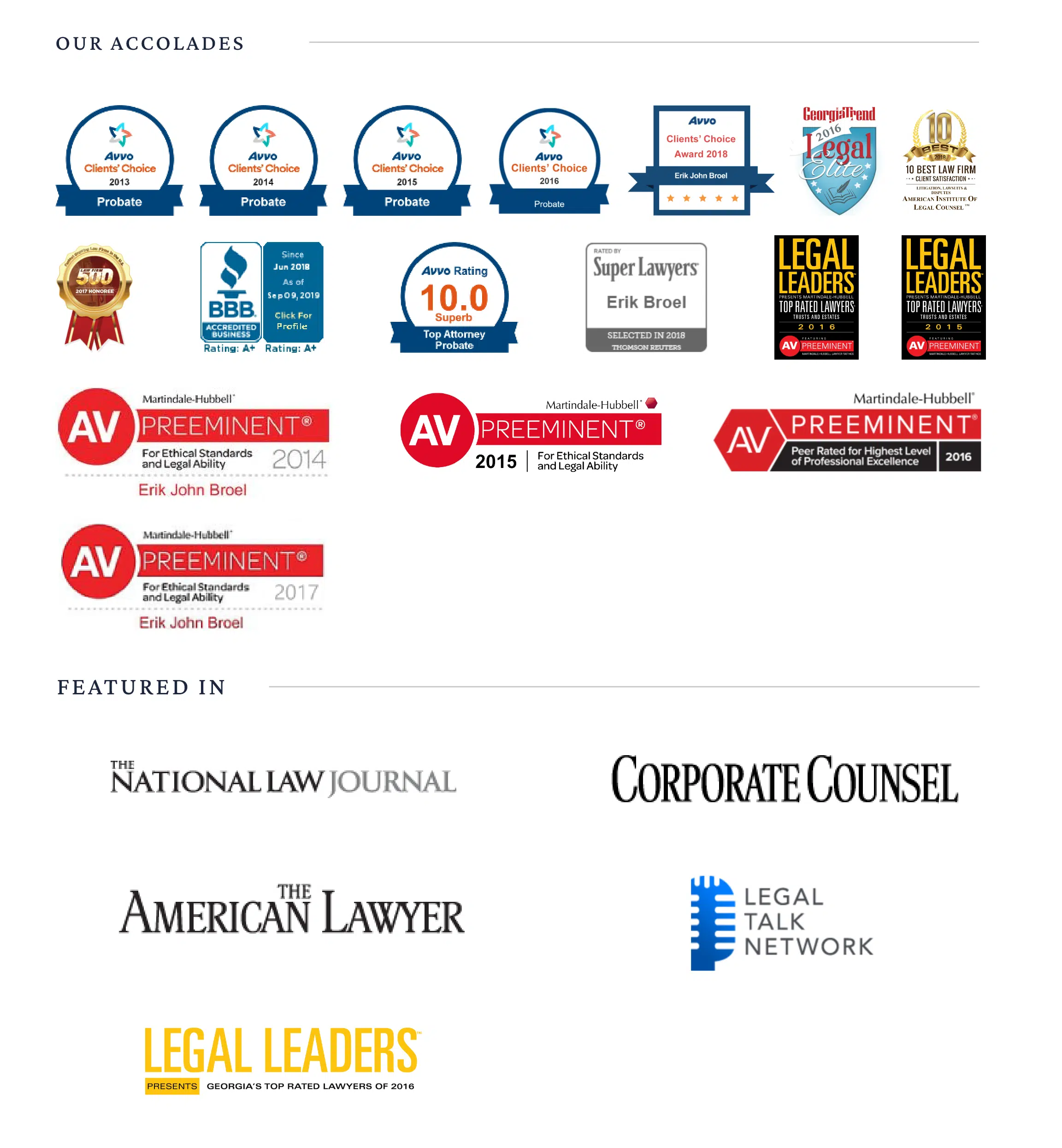Dealing with estate matters after a loved one passes can be quite a complicated experience. Moreover, tensions run even higher when a disgruntled family member or relative suddenly considers contesting a will.
In this article, we’ll uncover the reasons behind such objections and offer some guidance if you’re in this situation.
We’ll help you understand the potential grounds for contestation and explore all options available to ensure your loved one’s final wishes are honored.
You will be better equipped to respond to a will contest when you fully understand how the deceased initially intended to handle their estate.
This is where the Last Will comes in. It is a legally binding document that serves several purposes:
Under Georgia probate law, anyone concerned can challenge a will through a formal objection called a “caveat.”
Beneficiaries, heirs, and those whose inheritance can be affected by the will’s validity may raise objections. In some cases, creditors may also have the right to contest a will.
Contesting a will is often referred to as a caveat, which is just a legal word that means to challenge the validity of a will.
The caveat is a legal document that lays out all of your legal objections to the will.
When someone formally objects to a will, a legal dispute starts in the probate court, and the process will move through several stages:
First, when drafting the caveat, it is important to identify all of the legal grounds that apply. If you leave one out, you risk losing it unless the caveat is later amended.
When the caveat is filed, it is ok to simply state objections even if you do not yet have the evidence to support them.
After the caveat is filed, the case will enter the discovery phase, during which each side has the opportunity to gather evidence to prove its case.
During discovery and after it ends, it is common for either side to file motions asking the court to take action, such as excluding evidence or granting summary judgment.
It is also very common for mediation to be required during that time.
After discovery ends, the case will be scheduled for a trial. Each party will present their case and evidence, and the court will determine whether the will is valid or invalid.
As a result, it is vitally important to gather evidence to support the allegations made in the caveat. Without evidence, contesting a will is very unlikely to be successful.
If the caveat is successful, the will is rendered invalid, and the estate proceeds as if it did not exist. Depending on the situation in the estate, we could fall back on a prior will or state inheritance law.
If the caveat is unsuccessful, then the will is determined to be valid by the court, and the estate will proceed under the terms of that will.
This is a complex situation, and we do not recommend that you try to handle a will contest without a qualified probate attorney on your side.
After a person dies, some heirs or beneficiaries may be disappointed to find that the deceased’s wishes did not align with their expectations. But emotions alone may not be enough to support a legal challenge.
Here are some of the most common situations where contesting a will could make sense:
If these factors are in your favor, then it probably makes sense for you to look into challenging the will. If they are not, then a will contest may not make sense in your case.
At the time the caveat is filed, making allegations is enough. But, as the case proceeds forward, evidence will have to be obtained to prove the allegations.
Do you feel confident that the proof is out there and can be uncovered?
Contesting a will means that you are asking the court to overturn the will.
If that happens, the estate will either fall back to a prior will or to state law where there is no will. Does that help you achieve your goals?
This one only applies if you stand to inherit something under the will. If the will disinherits you, then this factor does not apply to you.
If you are going to inherit something under the will and the will has a no-contest clause, be careful! Handling the situation incorrectly, you could lose all of your rights under the will.
Sometimes, there are ways to avoid triggering a no-contest clause depending on what your goals are.
Once the objection is filed, the case will move forward to a time when evidence must be gathered, and after that, a trial will be scheduled.
At some point, the probate court will most likely require mediation, and there will be other informal opportunities to discuss ways to settle the case with the opposing party.
Unfortunately, a legal objection is often the only way to get the other party to agree to discuss a settlement.
This is because if you don’t object in time, the objection is waived, and the opposing side has no reason to try to work with you.
As you can imagine, challenging a will is a complicated process, and we recommend that you do not attempt it without the assistance of a qualified probate lawyer.
Generally, the deadline for objection is up to 30 days from your receipt of the petition to probate the will.
The documents you receive should include a letter from the probate court, which will tell you the official objection deadline for your case.
Since the objection window is short, don’t waste any time in taking action to handle the objection.
Once that window passes, it can be difficult to file a caveat late, and the court requires approval.
The petition to probate will be delivered to you by certified mail, by an overnight service such as FedEx, or by sheriff service, where the sheriff is sent out to physically hand you the document.
The objection is filed with the clerk of the probate court, where the petition to probate the will was filed.
A quick note: If you believe the case should have been filed in a different state or county, that is a very complicated situation, and you need to get professional help immediately.
Recognizing when someone has already filed an objection will help you stay on guard. Keep an eye out for these signs:
The idea of facing an aggressive relative who objects to the will can be unsettling. To protect your rights and interests, we recommend reaching out to a probate attorney as a first step. They can offer you guidance and provide legal advice throughout the process.
While you prepare for what’s next, you can start collecting any evidence that may support the will’s validity. It is always a good idea to keep a detailed record of all communication and actions related to the will and estate.
For a more peaceful approach, you may also consider maintaining open communication with the person objecting to the will. Try to understand their concerns and explore resolutions through discussion or mediation.
If someone has decided to take matters further and filed a caveat, here are proactive steps you can take:
Throughout the process, stay informed about the progress of the case and communicate with your attorney. Understanding the developments and potential outcomes will help you navigate the situation effectively.
You can’t control other peoples’ actions, but you can take certain steps to protect the validity of your loved one’s will.
Consult a probate lawyer to review the will’s content and check its validity. It is also worth understanding the will’s provisions and how they affect your interests.
During probate, record all will-related communication and discussions with other heirs.
If someone expresses their intention to challenge the will, familiarize yourself with the possible grounds for contestation. This knowledge will help you anticipate if their reason is enough to support a legal objection.
If you were present during the will’s execution and can attest that the testator was of sound mind, consider providing a written statement. You can also identify witnesses who can testify to support this further. Both can help counter any claims of undue influence.
Lastly, help beneficiaries understand the implications of a no-contest clause if the will has one. It can discourage challenges by disinheriting those who contest it.
Some wills include a no-contest clause to discourage heirs and beneficiaries from contesting the will’s validity. Then again, there can be situations where a person may consider objecting, even if the clause exists.
For example, can someone contest a will if they are not in it? If someone stands to inherit nothing from the will, filing an objection may be less risky for them.
On the other hand, someone who is entitled to receive a specific amount faces a more complex decision.
Our legal team advises clients to weigh their options. If a client entitled to inheritance wants to contest the will, an unsuccessful objection could mean losing all their share.
We take the no-contest clause very seriously, so we highly advise discussing this matter with an experienced lawyer. Your attorney can guide you on whether challenging the will makes sense.
If the caveat is successful, the court will declare the current will invalid and disregard its instructions. The court may then refer to a previous will that has not been contested or follow the state’s inheritance laws to distribute the estate.
A successful contest can change the way the estate is divided among beneficiaries. If a valid will does not exist, the personal representative may distribute the assets according to intestacy laws.
On the other hand, if a will contest is unsuccessful, the existing will shall be considered valid, and the estate distribution will proceed as outlined in that will.
In such cases, statistics are not exactly relevant, the concrete details of your case are. To assess the chances of having a successful contest, you should discuss your case with an experienced probate lawyer.
Contesting a will can be an emotionally taxing experience, but anticipating challenges can empower you to take proactive steps and safeguard your loved one’s final wishes.
If you find yourself in this situation, seeking guidance from an experienced probate attorney can support you through the complexities of a caveat. Please don’t hesitate to contact our office at (770) 796-4685 to schedule a consultation.
Compassionate listeners, knowledgeable guidance. Schedule a free consultation with our team and let us help you and your family with your legal concerns.
GET IN TOUCH 770-796-4685Learn Important Probate Essentials, including key things that go wrong in an estate, how to prevent them, and what to do if they happen.



© 2024 Georgia Probate Law Group by Broel Law, LLC. All rights reserved.